OUR BUSINESSES
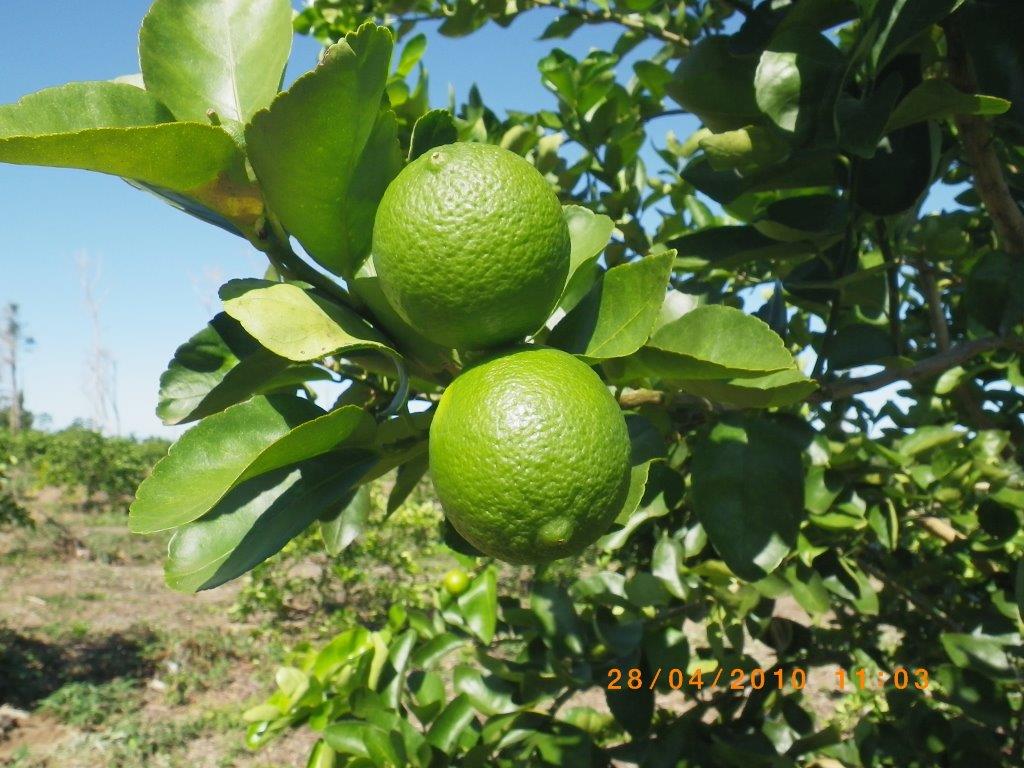
We split the Peralba businesses into three groups of activities; those that:
Reached a level of business maturity that ensures a solid economic return or whose potential is of similar economic size or even bigger than the current ones, and are about to reach such high level of attractiveness
In which we already accumulated sufficient experience to enable us to design (with high degree of certainty) projects with attractive level of returns, particularlythose cultures that we already experimented on and that couldbe resurrected and expanded
Refer to the development of the natural potential of the farm, but in other areas of activities and opportunities, not necessarily linked to agriculture
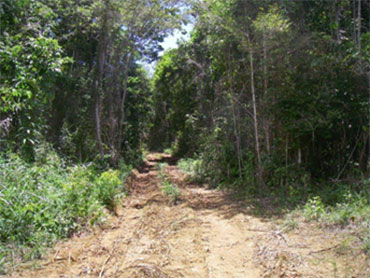
The third group of activities belong to the characteristics of our land and to the nature of the area: the beauty of the place, economic extraction of valuable woods, subsoil minerals (sand, gravels, for road constructions – the future bridge to Salvador and the new international airport) and renewable resources, such as drinking water and energy generation.
The pristine, even primitive, beauty of our forests is evident: just fly over with Google Earth and you can see a patch of green rare in the whole of the Brazilian coast: it is a beautiful piece of paradise.
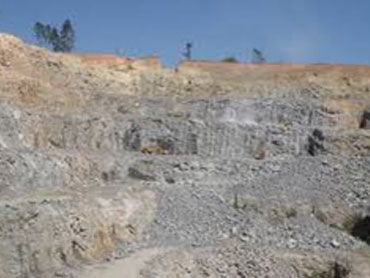
The fourth activity we considered seriously as being potentially viable, is mineral extraction: sand for construction, gravel and stones. With the bridge project that would unite Salvador to Itaparica and to the new international airport, such commodities near the construction works would be highly attractive. Also for water supplies and energy generation: our Tirirí could be harnessed with a dam to supply fresh water and energy, without major impact to our forest. Several surveyors for the project visited our lands and confirmed such opportunities.
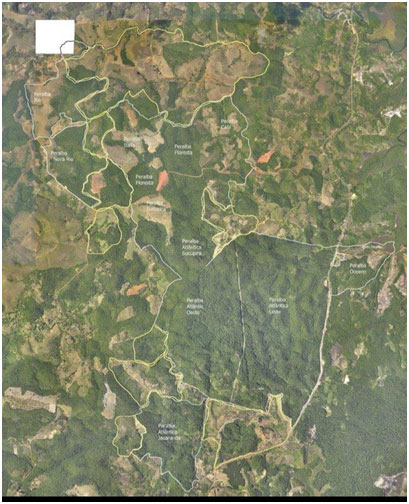
It may be necessary at this stage to ponder some considerations: our priority is and always was the protection of our forest. bring undesirable and unwanted effects on the forest.
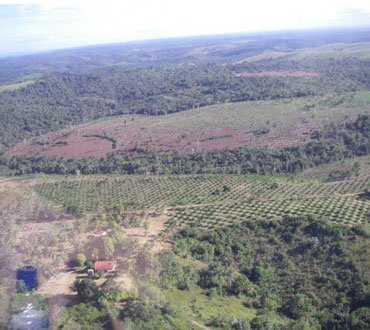
The first group of businesses are today restricted to the two most important cultures: limes, with 86% of our income, and coffee, with 9%. Our initiative and success in these crops encouraged several nearby farmers to plant limes. One entrepreneur from Santo Antonio is planting 50 hectares just one mile from us. 10 hectares about 10 miles from us, were planted inside a cattle farm five years ago and we have an ongoing agreement to buy all his production for our packing house. Five small owners planted one to three hectares in 2014 and we expect to sell us limes in 2018. And with all of them we have an agreement to give them technical support and counseling.
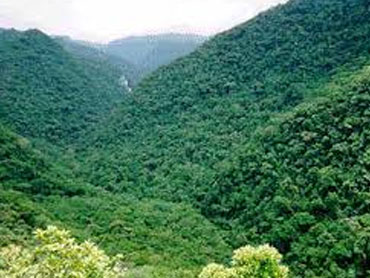
The central idea is serve the market for nature lovers by establishing an Eco-resort complex. We started one in 2007 by presenting a project to the Development Bank for Bahia, but slowly our attention was taken by the agricultural projects and we neglected it and it was set aside. However, we never forgot about it… on the contrary: we often ask rhetorical questionslike ‘I wonder where we would have been had we gone the Eco-resort way…’. We need to reconsider the opportunity and a new design with new ideas and solutions. So much so, that we dedicated one whole chapter to it in this site.
A second activity in this group would be the rational extraction of valuable wood from the forest. This would be a new trial for us to move into. The usual experts warned us of the gratifying results we could master by engaging in such ecological activities. The sequestration of carbon would be one of them, by planting strands with types of wood able to concentrate high levels for carbon
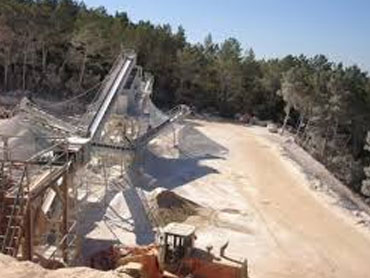
In their opinion, such a scheme is viable, would supply most water need for the airport and, with a carefully designed dam, 22% of the energy needs could come from water driven generators without touching our waterfalls.It would have to be carefully designed and excecuted but could be done with modern construction methods and in respect to actual sensitivities and concerns… and we would make sure that it would be done correctly.
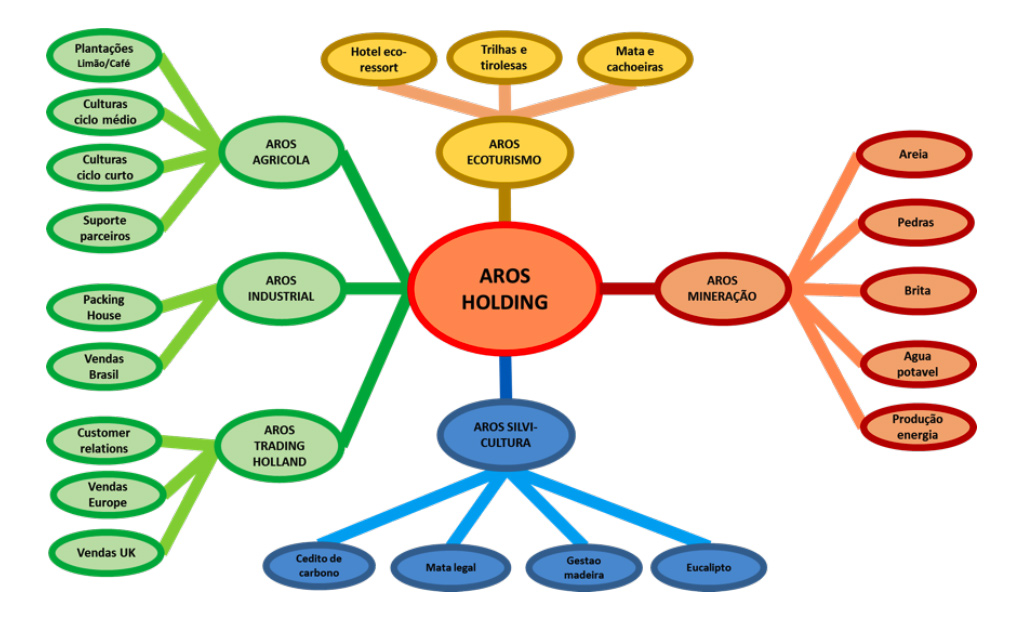
The following design reproduces graphically our understanding of what AROS will be in the future.
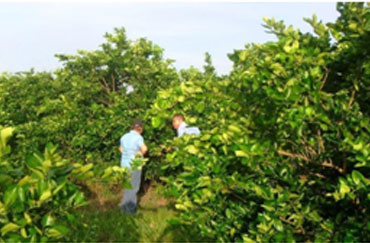
It is a support without high returns: by helping these new entrants in producing high quality fruit, we guarantee high yields for them and for us, and, most of all, no surprises when our fruit are tested for MRL (Maximum Residual Level) when they reach the EU consumers.
If plans go according to our hopes and expectations, Jaguaripe will become a new limes pole, and if the quality will be kept high from the very start, it may turn out to be a bonus for the local economy.
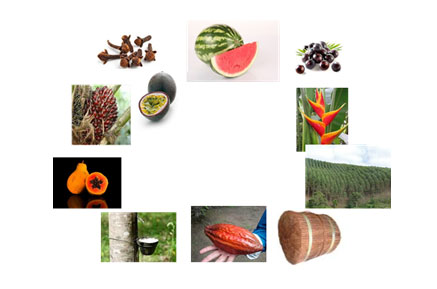
The second group of businesses refer to our current small crops which amount for about 4% of our income. They are the short and medium life cycle cultures where we accumulated through practical experience so that we will be able to project costs and returns with a high level of confidence.
We call them ‘our future opportunities’, all of them with a relatively low level of investment and a strong support of knowledge and in house skills. On the other hand, they willdemand a high level of energy and dedication, qualities that we will have to bring in for these opportunities to become a reality.
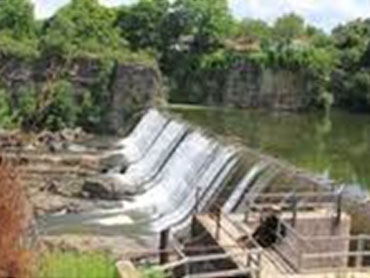
The third activity would be to sell or even rent tracts of forest to abide to the new ‘mata legal’ laws, where every land owner must have no less than 20% of his/her holdings covered with original trees. From what we read on the news, this market is quite a huge one and extremely profitable. With contracts well designed and enforced, we could guarantee the survival of our forest without all our effort at making the land produce to pay for the protection costs! These are ideas that only became reality recently, in 2015, but worth looking into it seriously.

Therefore, these are our groups of products:
Limes for export and coffee in a steady and solid basis, grouped in: AROS AGRICOLA with the plantations, AROS INDUSTRIAL, with the packing house and AROS TRADING with our branch in Holland
Short and medium lifecycle produces under the control of AROS AGRICOLA, ready to plan and invest in a diversification process of agricultural produces.
The future branching out to new activities, with AROS TOURISM, focused on a newly designed Eco-resort and facilities, AROS SILVICULTURAS, aimed at a rational management of the forest and supplier of ‘mata de lei’ to guarantee the long term survival of the forest, and AROS MINERAÇÃO, concerning ‘extratctivistic’ activities of construction materials, supply of drinking water and energy generation.
A careful analysis of the AROS HOLDING CO. will reveal the implicit limitsto our expansion plans imposedby such priority. We are painfully aware that introducing new cultures and activities may bring undesirable and unwanted effects on the forest.
This is why for examplewe discarded outright produces that would grow easily in our micro-climate, but whose husbandry would definitely impact on the original flora and fauna. If indoubt, discard, was our maxim.
Banana growth is an example: without going into many details, the prophylactic products necessary to allow this produce would have a negative impact on our forest, be it for the quantities needed, or be it for the kind of toxicity that active components would be conveying through spraying and soil addition.
Such concerns are reflected in the division of the whole farm. In the satellite image, it is easy to see that all plantations have been relegated to the upmost side, while in the south, the land has been preserved for the protection to the forest. Numerous other concerns will drive the location of the mining activities and energy production (see the yellowish cut near the road, at the bottom right of the image).
Last, but not least, the incursion of visitors would have to be closely monitored, so as not to have primal land stomped upon by countless. uneducated visitors.
The economic potential seems evident. Many a visitor alerted us of it. However, if anything were to happen onthese lines in the future, it will be carefully evaluated against all above mentioned concerns.
As the present focus is to clarify the potential of our business in agriculture, the following chapter will clarify our intentions in the following topics:
1. The limes, the coffee and the Eco-tourism
2. Short life-cycle cultures
3. Medium life-cycle cultures
The first point refers to our main present concern, while the last two clarify what we see as the natural expansion in the near future:
Essessão as culturas de:
Mamao
Maracja
Meloes e melancias
Piacava
Eucalipto
Flores ornamentais
Cacau
Acai
Cravo-da-india
Dende
Seringa
Details on the other potential activities will be object of presentations and modeling to be developed in the future…
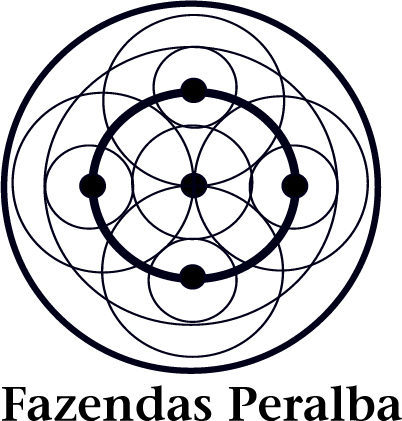
.jpg)
.jpg)
.jpg)
.jpg)
.jpg)
.jpg)
.jpg)
.jpg)
.jpg)
.jpg)
.jpg)
.jpg)
.jpg)
.jpg)
.jpg)
.jpg)
.jpg)
.jpg)
.jpg)
.jpg)